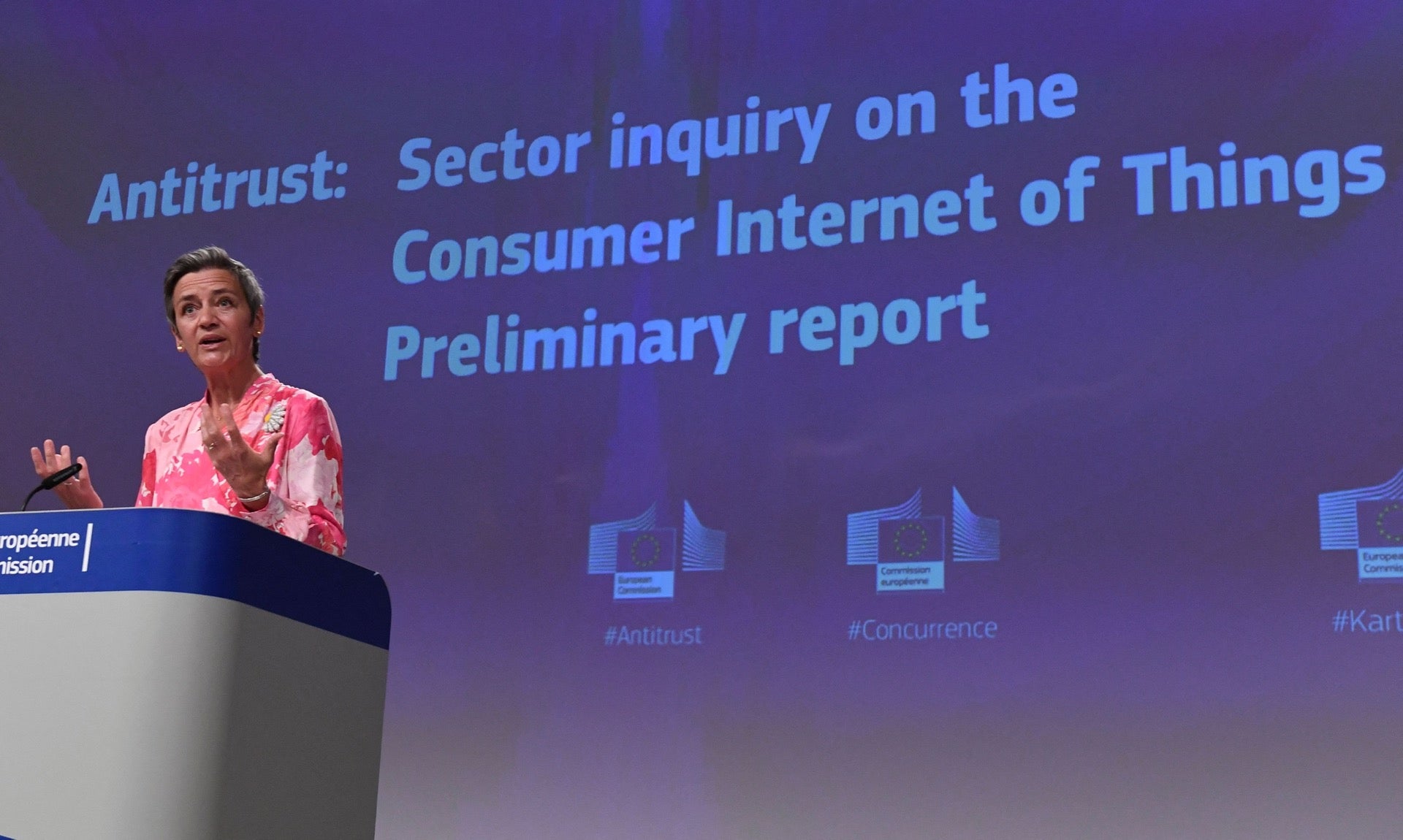
The EU has warned that competition in the Internet of Things (IoT) industry could be throttled by the market dominance of Amazon, Apple and Google.
The statement came as the European Commission published its preliminary results of its competition probe into the IoT market.
“When we launched this sector inquiry, we were concerned that there might be a risk of gatekeepers emerging in this sector,” said Margrethe Vestager, vice-president at the European Commission. “We were worried that they could use their power to harm competition, to the detriment of developing businesses and consumers.
“From the first results published today, it appears that many in the sector share our concerns. And fair competition is needed to make the most of the great potential of the Internet of Things for consumers in their daily lives.”
It is understandable why the European Commission is interested in the sector. The IoT space is big business, with the market expected to cash in $1.1tn in revenue by 2024, according to a recent thematic research report from GlobalData.
The preliminary results of the probe are based on information provided by over 200 IoT companies of different sizes across Europe, Asia and the US.
How well do you really know your competitors?
Access the most comprehensive Company Profiles on the market, powered by GlobalData. Save hours of research. Gain competitive edge.

Thank you!
Your download email will arrive shortly
Not ready to buy yet? Download a free sample
We are confident about the unique quality of our Company Profiles. However, we want you to make the most beneficial decision for your business, so we offer a free sample that you can download by submitting the below form
By GlobalDataDespite noting that the sector is pretty new, the EU warned that major Silicon Valley firms have already cornered the market.
Several of the people polled suggested that they’ve struggled to compete with vertically integrated companies with wide-sprawling ecosystems of their own.
In other words, Amazon, Apple and Alphabet have achieved a market dominance that is difficult to penetrate by not only having developed their own Siri, Alexa and Google Assistant smart assistants, but also by producing many of the most popular connected devices in the IoT sector.
The main concerns raised by the EU included exclusivity in the form of not allowing several voice assistants on the same device.
The EU’s preliminary report also noted that Big Tech firms have positioned themselves as intermediaries between users on one end and consumer IoT services on the other, meaning they’d be able to control user relationships as well as the generation and collection of data.
The collection of data could also mean Amazon, Apple and Google – because of their dominant position – have an unfair advantage to competitors as they could gather more insights about consumers.
Following the initial results of the probe, the European Commission is now inviting all interested parties to contribute to a public consultation until 1 September 2021. The European Commission plans to publish the final report in the first half of 2022.
While market stakeholders were optimistic about the probe aiming to make the IoT market fairer, they noted no big changes should be expected from Silicon Valley anytime soon.
“The likely timescales for any legislative shift mean that the market will already be well advanced before the major players are subject to prescriptive requirements regarding access to their systems,” Mark Blunden, partner and head of technology at specialist tech law firm Boyes Turner, told Verdict.
As a case in point, it was only this week that Google announced it would allow search engine rivals to appear for free on a choice screen on Android phones. The decision came two years after the European Union slapped Alphabet with a £5.16bn fine for unfairly using its market dominance to its advantage in 2018. And even then, the changes won’t be implemented until September.
“There is intense competition from many companies in the smart home sector,” an Amazon spokesperson told Verdict. “There will not, and should not, be one winner. We recognized this from the beginning and designed Alexa accordingly. Today, Alexa is compatible with over 140,000 smart home products, and we make it easy for device makers to integrate Alexa directly into their own products. We also founded the Voice Interoperability Initiative – now 80 companies strong – which is committed to giving customers the choice and flexibility to access multiple voice services on a single device.”
Verdict reached out to Google and Apple for comment, but they failed to return our request before the publication of this story.






